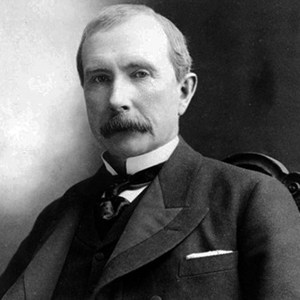John D. Rockefeller founded the Standard Oil Company, which was the country’s first large business trust. While he was one of America’s wealthiest businessmen, Rockefeller was also a prolific philanthropist.
Early Life
Rockefeller was born in 1839 in New York. He founded his first successful business at the age of 20, which grossed $450,000 after its first year. In 1863, Rockefeller opened his first oil refinery near Cleveland. In 1870, Rockefeller and his business partners, which included his brother William and Henry Flagler, incorporated the Standard Oil Company of Ohio. As it became more successful, Standard Oil began to buy out the competition.
Oil Monoply
By 1882, the company controlled nearly every aspect of the U.S. oil business by purchasing pipelines, building its own oil drums, and operating its own transportation system. However, the business practices Rockefeller used to build his monopoly drew criticism. The New York Times reported in 1937:
He was accused of crushing out competition, getting rich on rebates from railroads, bribing men to spy on competing companies, of making secret agreements, of coercing rivals to join the Standard Oil Company under threat of being forced out of business, building up enormous fortunes on the ruins of other men, and so on.
Emergence of the Sherman Antitrust Act
The proliferation of business trusts ultimately prompted the passage of the Sherman Antitrust Act, which prohibited trusts and combinations that restrained trade. Standard Oil was first found to have violated Ohio’s antitrust laws and forced to dissolve. Rockefeller reformed the company as the Standard Oil Company of New Jersey. In 1911, the U.S. Supreme Court found the reconfigured Standard Oil had violated the Sherman Act and ordered its dissolution.
While he was a shrewd businessman, Rockefeller was a devoted philanthropist, particularly in his later years. He founded the University of Chicago and the Rockefeller Institute for Medical Research. Overall, he donated more than $530 million to various educational, religious, scientific, and social endeavors.








